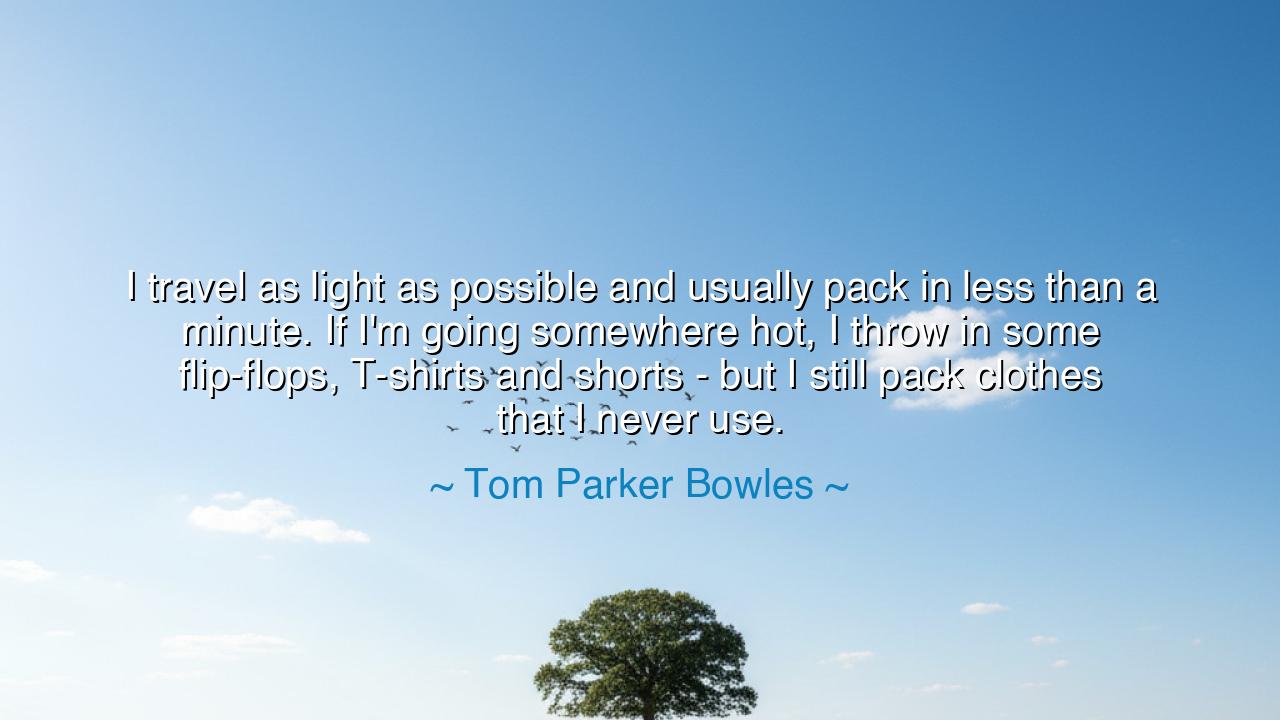
I travel as light as possible and usually pack in less than a
I travel as light as possible and usually pack in less than a minute. If I'm going somewhere hot, I throw in some flip-flops, T-shirts and shorts - but I still pack clothes that I never use.






So spoke Tom Parker Bowles, traveler and chronicler of flavors, when he declared: “I travel as light as possible and usually pack in less than a minute. If I’m going somewhere hot, I throw in some flip-flops, T-shirts and shorts—but I still pack clothes that I never use.” Though his words seem simple, about the small ritual of preparing for a journey, they contain within them a truth that has echoed through the ages: that life itself is a journey, and we burden ourselves with more than we truly need.
At the heart of his reflection lies the paradox of travel: we long to move freely, lightly, unencumbered, and yet we carry with us things unnecessary—objects we never wear, weights we never use. This mirrors the human spirit, for how often do we pack into our souls burdens of worry, fear, regret, or possessions that do not serve us? Parker Bowles speaks of shirts and sandals, but in his words we may hear the deeper lesson: that wisdom lies in discernment, in knowing what is essential, and what is but a needless addition.
The ancients knew this truth well. When the philosopher Diogenes was found living with almost nothing, he declared that the fewer possessions he had, the closer he was to freedom. Alexander the Great, visiting him, offered wealth, but Diogenes simply replied, “Stand out of my sunlight.” The king carried empires, the philosopher only his cloak, yet both stood in dialogue about what truly matters. Parker Bowles’ habit of packing swiftly and lightly echoes this same ancient wisdom—that liberation is found not in carrying more, but in carrying less.
History also shows us the peril of excess. The doomed march of Napoleon’s army into Russia was not only broken by winter, but also by the weight of baggage that slowed their retreat. Conversely, explorers such as Marco Polo and Ibn Battuta, who roamed continents, survived because they traveled with agility, able to adapt, able to move swiftly. The one who carries too much becomes prisoner to their own load, while the one who carries little walks freely into the unknown.
Yet Parker Bowles admits with humility that he still packs clothes he never uses. This is the gentle truth of being human: though we strive for simplicity, we often cling to what is unnecessary, “just in case.” Here lies the reminder that the path of lightness is not achieved in a single act, but through constant practice. To travel light—in luggage, in life, in spirit—is a discipline, one that must be renewed each time we set out upon the road.
The lesson for us, then, is clear: in all journeys, seek to carry only what is essential. Do not waste time or energy preparing endlessly for every possible circumstance. Trust yourself to adapt, and let your heart, not your possessions, be your compass. Whether you are packing for a trip, or preparing for a new season of life, remember that too much weight hinders, but lightness grants freedom.
Practically, this means simplifying both outwardly and inwardly. When you travel, take only what you truly need, and leave space for discovery. In life, release grudges, fears, and unnecessary possessions that weigh down your spirit. Live with the courage to trust that you will find what you need along the way. For the traveler who journeys lightly is free not only to move, but to embrace the unexpected with joy.
Thus, Tom Parker Bowles’ words, though clothed in the humor of flip-flops and forgotten shirts, shine with timeless counsel: to live fully, learn to pack lightly. Walk into the world unburdened, and you will find that the less you carry, the more wonders you are free to hold.






AAdministratorAdministrator
Welcome, honored guests. Please leave a comment, we will respond soon